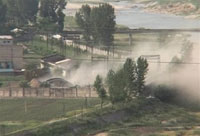Talks on North Korean nuclear program to resume in Beijing this week
Negotiations on North Korea's nuclear program will resume this week for the first time in nine months, China said Tuesday.

The talks have been on hold since October due to a dispute over North Korea's obligation to declare its nuclear programs.
"The six-party talks have made important progress. In order to move forward ... all parties have agreed to have a meeting in Beijing on July 10," Foreign Ministry spokesman Qin Gang told reporters.
Qin said the meeting was scheduled for three days, but that could change depending on whether progress is made.
The talks - which include China, Japan, Russia, the U.S. and the two Koreas - are back on after Pyongyang submitted a partial declaration of its nuclear programs and made progress in disabling its main atomic facility.
The talks were expected to focus on how to verify the North's nuclear list.
In response to the declaration, the United States announced it would remove the North from a list of state sponsors of terrorism and relax some economic sanctions against the communist nation.
To demonstrate its commitment to disarm, Pyongyang destroyed the cooling tower at its main Yongbyon nuclear complex.
But signaling potential difficulties in the upcoming talks, the North said last week it will not take further steps to dismantle its nuclear program until the U.S. and its other negotiating partners provide it with promised fuel oil and political benefits.
South Korean President Lee Myung-bak said it is "not easy" and "will take time" to get North Korea to abandon its nuclear programs.
"We have to persuade the North to realize without fail" its nuclear dismantlement, Lee said in an interview with Japanese newspapers, according to the president's office.
Lee, the South's first conservative leader in a decade, also called the North's nuclear declaration "insufficient" because it did not include details about atomic weapons.
Earlier Tuesday, North Korea rejected any possibility of summit talks with the South though Lee said he was willing to meet to speed up the North's dismantling of its nuclear programs.
Pyongyang became enraged as Lee took a harder line with his communist neighbors than previous administrations and said he would review previous summit agreements to see if they are financially feasible. The move has led to a suspension of all government-level dialogue between the two sides.
The North's Committee for the Peaceful Reunification of the Fatherland said it was "preposterous" for Lee to suggest such a meeting, accusing Seoul's conservative president of overturning previous agreements.
Lee "totally negated and ignored the summit meetings and declarations which were unanimously hailed and supported by the whole nation and world," the committee said in a statement, carried by the official Korean Central News Agency.
The Korean War ended in 1953 with a truce, not a peace treaty, which means the two sides technically remain at war. Relations improved significantly under Lee's two liberal predecessors, who pursued detente with North Korea with massive aid and concessions. But Lee opposes providing unconditional aid to the North.
Subscribe to Pravda.Ru Telegram channel, Facebook, RSS!


